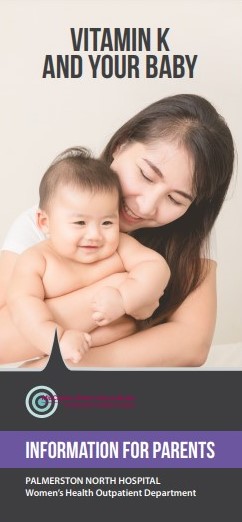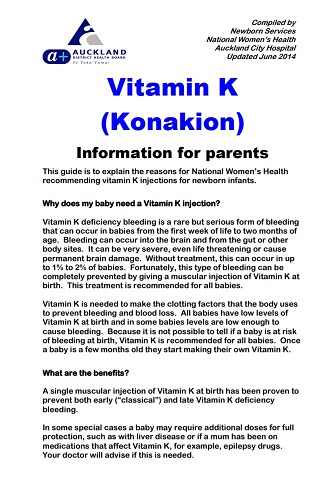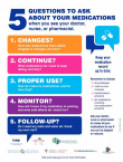Vitamin K is a substance in our bodies that helps our blood to clot and stops bleeding. Vitamin K is naturally present in the body and is made in the intestine from food.
Low or no data? Visit zero.govt.nz, scroll down the page then click on our logo to return to our site and browse for free.
Vitamin K for newborn babies to prevent serious bleeding
Key points about vitamin K for babies
- Vitamin K helps blood to clot and prevents serious bleeding.
- All babies need vitamin K to produce clotting factors.
- Babies have low levels of vitamin K in their bodies at birth.
- Without vitamin K, babies are at risk of getting a rare bleeding disorder called VKDB (vitamin K deficiency bleeding) or HDN (haemorrhagic disease of the newborn).
- VKDB is serious and can cause brain damage or death.
- A single vitamin K injection given at birth is the most effective way of preventing VKDB.

All babies are born with low levels of vitamin K in their bodies. Vitamin K is made naturally in the intestine but as newborn babies have very little bacteria in their intestine they don't make enough. As your baby grows they will start to make enough vitamin K.
Breast milk contains vitamin K but in too small an amount to provide protection. Too little vitamin K puts your baby at risk of a rare disease called VKDB (vitamin K deficiency bleeding).
All newborn babies have low levels of vitamin K and so they are at risk of VKDB. VKDB is rare and the chance of babies developing it is small, even if they have not received extra vitamin K. But, if babies do develop VKDB, it can cause internal bleeding leading to death, or permanent damage to the brain and other organs.
Babies who are at increased risk of VKDB include:
- Babies born to mothers taking certain medicines, eg, some medicines for epilepsy and tuberculosis, and anti-coagulants. If you are on any of these medicines, talk to your healthcare provider or midwife before your baby is born.
- Premature babies (born early).
- Sick babies.
- Babies who haven't received vitamin K at birth.
- Exclusively breastfed babies who have not had vitamin K at birth.
- VKDB can happen in the first day of a baby's life but this is rare – it usually happens to babies of mothers taking certain medicines.
- VKDB happens most often in the first 1–7 days of a baby's life.
- VKDB can happen up to about 6 months of age in babies with liver or bowel problems, or exclusively breastfed babies who have not had vitamin K at birth.
Babies have low levels of vitamin K in their bodies because:
- vitamin K is mainly made by bacteria in the gut and there are few bacteria in a baby's gut at birth
- babies don't get enough vitamin K from their mothers during pregnancy or breastfeeding./li>
The most reliable way to give babies vitamin K is by an injection into the muscle in the leg (intramuscular injection). One injection given just after birth will protect your baby for many months.
It is possible to give babies vitamin K by mouth (orally). However, this is not recommended because:
- vitamin K is not absorbed as well when given by mouth
- the protection doesn't last as long and so 3 doses are required (at birth, at 5 to 7 days and at 6 weeks)
- there may be doubt as to whether the dose has been swallowed
- there is a risk that the later dose may be forgotten
- some babies may have conditions that prevent absorption of vitamin K from the gut.
All babies need vitamin K. This includes babies who are premature, very small or sick, as well as babies having surgery.
Research and practice have shown that giving vitamin K by injection at birth is safe and effective. Babies in Aotearoa New Zealand, and in many other countries, have been given vitamin K injections for many years without problems.
Having the injection does not cause any health problems but some babies have a slight swelling or soreness at the site of the injection for a day or two.
One study in the early 1990s suggested that injections of vitamin K might be linked to one type of childhood cancer. Later research has proven that vitamin K is not associated with any kind of childhood cancer, whether it is given by mouth or by injection.
It is your choice whether or not your baby receives vitamin K and whether it is given by injection or by mouth. Giving vitamin K by injection provides the best protection for your baby. Giving vitamin K by mouth (orally) does not provide as much protection for your baby and they will need to have 2 more doses over a period of weeks.
Not giving vitamin K at all means that your baby is at risk of getting a severe, preventable health problem and you should watch closely for any warning signs of bleeding.
If you decide against your baby having vitamin K, you need to watch very carefully for symptoms of VKDB (vitamin K deficiency bleeding). You should always see your doctor urgently if your baby has any of the following warning signs:
- Easy bruising increasing.
- Bruising around their head and face.
- Bleeding from the nose, gut or umbilical cord (bleeding and bruising are not normal in the first months of life).
- Irritability, vomiting, paler than usual skin or (for dark skinned babies) pale appearing gums which might be due to internal bleeding.
- Your baby is over 3 weeks old and there are any signs of worsening jaundice.
Your lead maternity carer (LMC) can give you more information about vitamin K.
Resources
Vitamin K (Konakion) - information for parents(external link)(external link) Starship NZ
Vitamin K and your baby(external link)(external link) MidCentral DHB, NZ, 2018
5 questions to ask about your medications(external link) Health Quality and Safety Commission, NZ, 2019 English(external link), te reo Māori(external link)
References
- Darlow BA, Phillips AA, Dickson NP. New Zealand surveillance of neonatal vitamin K deficiency bleeding (VKDB) – 1998-2008 J Paediatr Child Health 2011;47(7):460-464 (external link)(external link)
- Vitamin K prophylaxis in the newborn Medsafe NZ, 2013(external link)(external link)
- Vitamin K for newborn babies: Information for parents(external link)(external link) National Health and Medical Research Council, Paediatric Division of the Royal Australasian College of Physicians, Royal Australian and New Zealand College of Obstetrics and Gynaecology, Royal Australian College of General Practitioners, Australian College of Midwives. 2010
Brochures

MidCentral DHB, NZ, 2018
5 questions to ask about your medications
Health Quality and Safety Commission, NZ, 2019
Credits: KidsHealth NZ. Healthify He Puna Waiora editorial team. Healthify is brought to you by Health Navigator Charitable Trust.
Last reviewed:
Page last updated:







